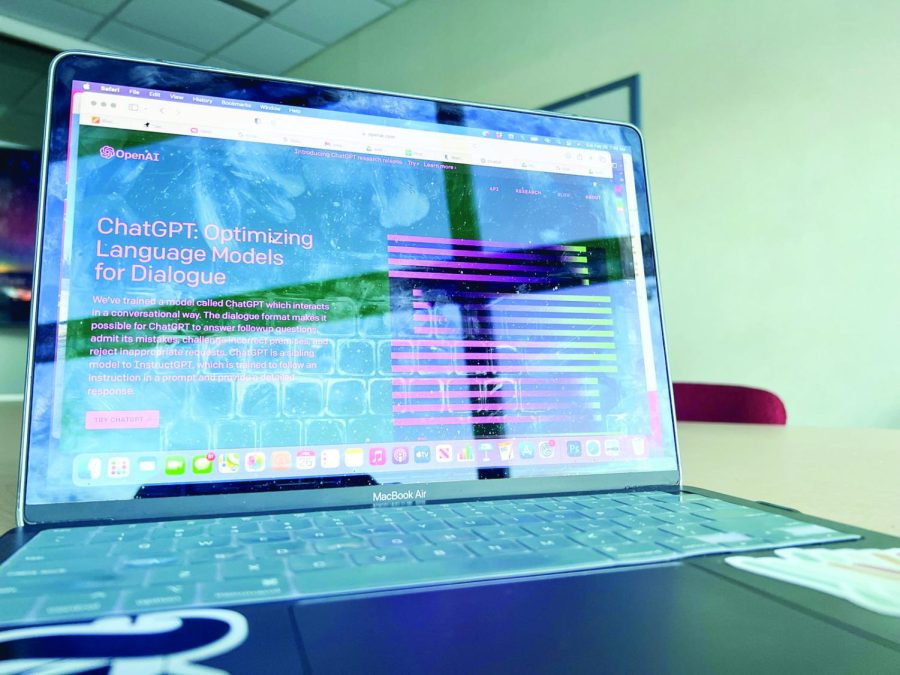Panel discusses how ChatGPT could impact education, humanity
Feb 27, 2023
The Grand Valley State University Quest Series held its inaugural event called the “ChatGPT Panel” on Feb. 22. The Quest Series is part of the Academic Affairs forum to help discuss current issues within the GVSU community.
This particular event was held in collaboration between the Divisions of Academic Affairs and Information Technology, facilitated by Provost Fatma Mili. The panelists were from various departments across the university such as writing, digital studies and technology. The panelists discussed the technology of ChatGPT and how the program could shape the future.
“ChatGPT, we’ve probably all heard, is a language model,” said Professor of Communication Studies Corey Anton. “At its heart, it’s a deep learning model. With ChatGPT, you feed it a prompt, and it goes token by token, or word by word, in your prompt and generates another word.”
While text-generated artificial intelligence has existed for the last forty years, Anton said the advancements for ChatGPT allow the model to invert context and create a web of predictions for language to create meaning.
“(ChatGPT is) a deep-neuro network which is massive and is somewhat like a brain so to speak, but it’s connected by numbers that pass information around,” Anton said.
Connections within the ChatGPT system make it possible for users to input a fairly long prompt and receive responses of around 2048 words in a row.
“The self attention (ability to create a sequence), though, is probably the key part of ChatGPT that we’re all thinking about,” Anton said. “It allows it (ChatGPT) to offer context. So probably the biggest advance in ChatGPT compared to earlier models is the network itself now can infer and make guesses as to what ambiguous parts of language mean.”
Director of the GVSU Writing Center, Patrick Johnson, is optimistic that ChatGPT can provide students with better tools to begin their writing and create rough drafts for a foundation to work from. He compared ChatGPT’s potential impact on education to other resources on the internet people were initially fearful of.
“When Wikipedia first came out, I remember there being a lot of conversations in academic circles about it ending the research process,” Johnson said. “And what ended up happening was faculty developed better assignments, clearer expectations and developed the idea of saying Wikipedia’s a great place to start but a terrible place to end.”
Similarly, GVSU’s Vice President for Information Technology and Chief Digital Officer Miloš Topić is hopeful for the future of ChatGPT on campus.
“I see it as a draft, I see it, and AI in general, as helping us with the initial thoughts, ideas and creativity and saving time,” Topić said. “I would love to have AI-capable solutions across the university to take away mundane tasks from people that are completely mind-numbing.”
Both Johnson and Topić believe ChatGPT and similar systems can provide students and faculty with better opportunities to express creativity, something that a computer cannot replace nor replicate.
However, all panelists express concerns regarding the ethics of AI and ChatGPT. Many panelists felt it’s important to remember that AI is a tool rather than a replacement for what humans can do.
“It is impressive, but it’s not magic,” said Laurence José, associate professor of writing and director of the digital studies minor. “It’s based on probability, so we call it intelligence, but I think it also works well remembering it’s not the same as the human brain – it’s not cognition. So when we’re thinking about the data, it’s just worth remembering what these models are and what they are not.”
Associate Vice President and Chief Technology Officer, Ben Rapin, said bias and discrimination can be coded into these models. Additionally, there’s a moral dilemma when it comes to using AI-generated text in regard to sensitive issues or tragedies.
Vanderbilt University recently faced backlash for using ChatGPT to write an address to the VU community about the mass shooting that happened at Michigan State University on Feb. 13. Many people felt that the use of ChatGPT for a “sympathetic” statement was inappropriate and insensitive.
“I agree there are a lot of ethical concerns that need to be taken into consideration with AI,” Topić said. “So I think it opens larger questions and larger things that we need to consider.”
Johnson ended the panel with a quote from a book called “Everything Bad is Good For You” by Stephen Johnson. The quote read, “Who’s better at chess, computers or humans? The answer is always ‘collaboration is strongest.’” Johnson used the quote to tie in his views on ChatGPT and technology.
“Humans and computers have very different skill sets and abilities, so working together is always going to be superior to one or the other and that’s really how I look at this program,” Johnson said.






















